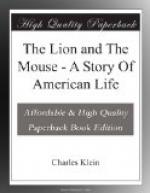misfortunes which had befallen Judge Rossmore and
he understood now the reason for Shirley’s grave
face on the dock and her little fib about summering
on Long Island. The news had been a shock to him,
for, apart from the fact that the judge was Shirley’s
father, he admired him immensely as a man. Of
his perfect innocence there could, of course, be no
question: these charges of bribery had simply
been trumped up by his enemies to get him off the bench.
That was very evident. The “interests”
feared him and so had sacrificed him without pity,
and as Jefferson walked along Central Park, past the
rows of superb palaces which face its eastern wall,
he wondered in which particular mansion had been hatched
this wicked, iniquitous plot against a wholly blameless
American citizen. Here, he thought, were the
citadels of the plutocrats, America’s aristocracy
of money, the strongholds of her Coal, Railroad, Oil,
Gas and Ice barons, the castles of her monarchs of
Steel, Copper, and Finance. Each of these million-dollar
residences, he pondered, was filled from cellar to
roof with costly furnishings, masterpieces of painting
and sculpture, priceless art treasures of all kinds
purchased in every corner of the globe with the gold
filched from a Trust-ridden people. For every
stone in those marble halls a human being, other than
the owner, had been sold into bondage, for each of
these magnificent edifices, which the plutocrat put
up in his pride only to occupy it two months in the
year, ten thousand American men, women and children
had starved and sorrowed.
Europe, thought Jefferson as he strode quickly along,
pointed with envy to America’s unparalleled
prosperity, spoke with bated breath of her great fortunes.
Rather should they say her gigantic robberies, her
colossal frauds! As a nation we were not proud
of our multi-millionaires. How many of them would
bear the search-light of investigation? Would
his own father? How many millions could one man
make by honest methods? America was enjoying
unprecedented prosperity, not because of her millionaires,
but in spite of them. The United States owed
its high rank in the family of nations to the country’s
vast natural resources, its inexhaustible vitality,
its great wheat fields, the industrial and mechanical
genius of its people. It was the plain American
citizen who had made the greatness of America, not
the millionaires who, forming a class by themselves
of unscrupulous capitalists, had created an arrogant
oligarchy which sought to rule the country by corrupting
the legislature and the judiciary. The plutocrats—
these were the leeches, the sores in the body politic.
An organized band of robbers, they had succeeded in
dominating legislation and in securing control of
every branch of the nation’s industry, crushing
mercilessly and illegally all competition. They
were the Money Power, and such a menace were they
to the welfare of the people that, it had been estimated,
twenty men in America had it in their power, by reason




